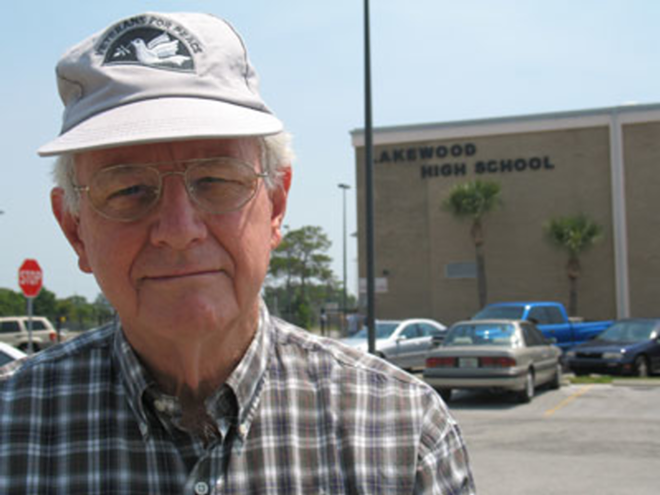
Forgive Dwight Lawton if he's a little impatient.
For the last two years, the 76-year-old Veterans for Peace member has been attempting to convince the Pinellas County School District to allow his group into high schools to engage students in other career paths besides military service. He's called school officials dozens of times, he's e-mailed them even more and attended nearly every school board meeting on the issue. He's protested outside of schools, risked arrest by handing out counter-recruitment literature and retained an American Civil Liberties Union lawyer.
But May will mark the 28th month since school district officials banned Lawton and his 50-member group of anti-war activists from campuses. This month also signals the end of another school year, which means, to Lawton, that another opportunity has been missed to prevent a student from making a rash decision regarding a future in the armed forces.
Last summer, school officials acknowledged that Veterans for Peace has a legal right to enter the schools. But they have yet to develop an official policy that governs the visits.
"They keep putting off dealing with this," Lawton says about school officials. "They think, 'If we just keep dragging our feet long enough, they'll just go away.'"
Since a July 2006 meeting at which school board members provisionally agreed to allow the group onto high school campuses, the board scheduled a workshop to flesh out the proposed policy. Yet school officials decided last month to scrap the original version of the policy and begin anew. Another workshop is set for May 15.
Lawton believes the district is "ducking the issue;" school officials and some board members say they're trying to come up with a policy that will please all parties.
"There was sufficient concern expressed [by the American Civil Liberties Union, Veterans for Peace and school board members] that we took it back to the drawing boards," says James Robinson, the school board attorney. "We're trying to arrive at a product that can go through rule-making procedures without a challenge."
Over the past two years, some school officials and board members have stated reluctance at allowing Veterans for Peace into the schools, afraid the activists' main purpose would be to vilify the military. Early on, critics maintained the group would have to offer positive alternatives and not just attack students' military options.
Lawton says the group has no problems with that caveat.
"We won't do political speech," he says. "We can't do political speech. We can create an atmosphere of questioning."
Lawton is also hoping rules overseeing frequency of visits by military recruiters will be addressed. He criticizes the almost weekly access given to military recruiters. (Lawton says Veterans for Peace would visit a particular campus once a month.) School board member Linda Lerner agreed that the frequency of the visits had been a problem, but school officials developed temporary guidelines that required recruiters (and other organizations) to request campus access through the guidance department, thereby limiting access and giving equitable time to other groups. "At some schools, [recruiters] were visiting time and time again," Lerner says. "Things are more tightened up now." Lerner says the new policy will address these issues.
Although the process may be taking longer than expected, school board attorney Jim Robinson says the district must allow Veterans for Peace into the schools in some capacity, citing a 1987 ruling by the 11th Circuit Court of Appeals. In Searcy v. Crim, which dealt with high school campus bulletin boards, the court ruled schools could not engage in "viewpoint discrimination."
"I'm not aware of anybody who is putting this on a back burner," Robinson says. "We know we need it. We lawyers recognize the need. It is our intent to have a policy in place."

